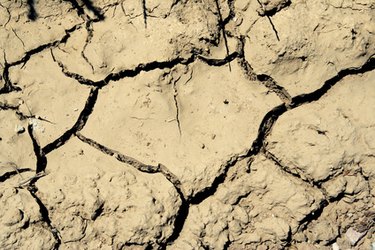
Hard garden soil can be a frustrating problem. It is difficult to get plants to grow in hard soil because water can't travel down to the roots. Hard soil is also inhospitable to earthworms and other garden-soil dwellers that contribute to a healthy lawn ecosystem. Fortunately, there are several effective nonchemical methods for treating hard soil. If you try these techniques and your soil is still too hard, consider digging up the lawn and adding several inches of loose manure and potting soil.
Organic Material
Video of the Day
Adding organic material like compost to your soil will gradually soften and aerate it while providing valuable nutrients for plants. Collect dead leaves, grass and food waste and store it in a large bin in your yard with a non-airtight cover to prevent animals from infiltrating. When the spring arrives, cover your lawn with a layer of the organic fertilizer. This works particularly well if you are planting new grass seed, but a thin organic layer over grass won't kill it, as long as some sunlight can get through.
Video of the Day
Avoid Chemical Fertilizers
Chemical fertilizers contain salt. Over time, they leach naturally occurring nutrients from the soil so that you have to use more and more fertilizer to feed your grass. Meanwhile, microbes and animals like earth worms are killed by the salts in the fertilizer. These creatures play a crucial role in keeping your soil aerated and soft. Without them, the soil becomes denser, drier and less nutrient-rich.
Add Worms
Many garden centers sell earthworms for improving the quality of gardener's soil. Earth worms eat soil and decomposing organic matter and excrete nutrient-rich material that nourishes grass and improves soil composition. The healthier your lawn's earth worm population, the better the condition of your soil. Earth worms are not harmful to the environment and they mostly stay out of sight, once released.
Cut Grass Tall
Cutting grass too short allows weeds, especially legumes, to thrive. All lawn plants are in competition for sunlight. When grass is cut too short it has to work harder to grow tall enough to reach the light. This weakens the plant and gives weeds a chance to thrive. Legumes, like clovers, form a lattice-work of roots that pack soil more tightly. Keep grass long, at least 3 inches, and only water once a week to encourage deep root growth.